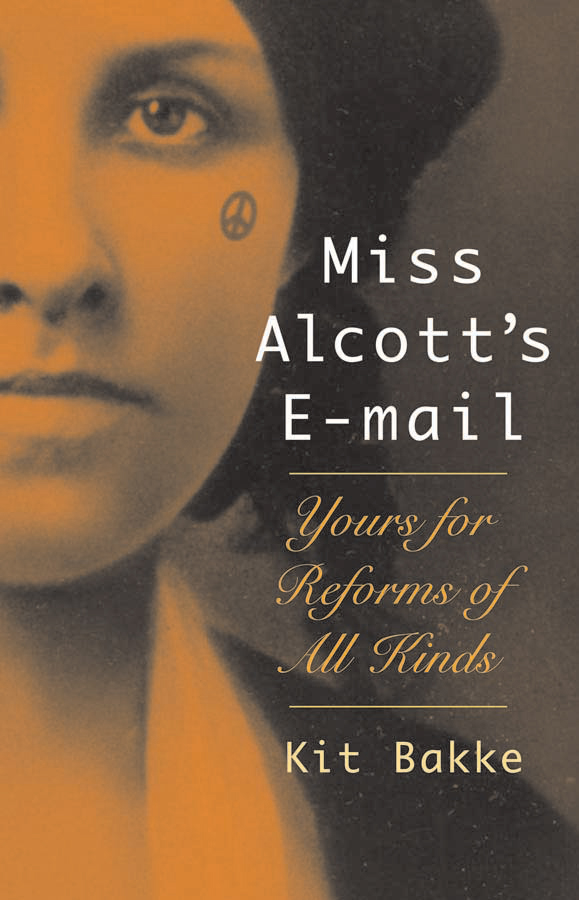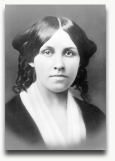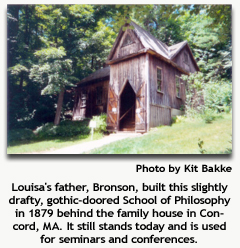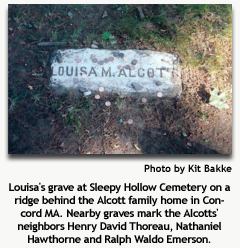Miss Alcott’s E-mail
 Title: Miss Alcott's E-mail
Title: Miss Alcott's E-mailPublished by: David R Godine; 2 edition
Release Date: August 1, 2007
Pages: 272
ISBN13: 978-1567923452
Buy the Book: Amazon, Apple Books, Barnes & Noble, Books-A-Million
Overview
 Louisa May Alcott may not look cool, but looks are deceiving. She had the courage of her convictions, and she had all the right convictions. She was experimental and she was loyal. She loved to travel and she loved her home. She valued freedom more than luxury. She was funny and smart, brave and persistent. When I wanted to describe the best of what it means to be an American, she is the perfect example.
Louisa May Alcott may not look cool, but looks are deceiving. She had the courage of her convictions, and she had all the right convictions. She was experimental and she was loyal. She loved to travel and she loved her home. She valued freedom more than luxury. She was funny and smart, brave and persistent. When I wanted to describe the best of what it means to be an American, she is the perfect example.
Louisa was born November 29, 1832 in Germantown Pennsylvania, on her father’s birthday. She was the second of the four daughters she later made famous in Little Women.
Her father Bronson Alcott is a difficult man to pin down. He was a self-taught philosopher who was endlessly fascinated with his own mind. He wrote a five million word journal describing his every thought. His uncompromising idealism impressed Ralph Waldo Emerson so much that he invited the Alcotts to live near him in Concord MA.
All Bronson’s navel-gazing left him little time to earn a living; that was up to his wife Abba Alcott, and then his daughter Louisa. To give him credit, however, Bronson was a staunch abolitionist and a supporter of women’s right to vote when both were highly unpopular and sometimes dangerous positions. He ran a school for a while in Boston, which was closed down by angry, bigoted parents when he admitted a black girl to his class.
 Louisa was the rowdy daughter, just like her creation Jo March in Little Women. She loved nature, jokes, plays and her family. She was very athletic for her day, going on daily runs in the woods and fields around Concord and Boston to keep her mind and muscles in shape. All that ended, though, after she caught typhoid while working as a nurse in a Union Army hospital in Washington DC during the Civil War. The treatment for typhoid in those days was an oral form of mercury, now known to be toxic. Louisa suffered terrible stomach, eye and muscle pains from mercury poisoning for the rest of her life.
Louisa was the rowdy daughter, just like her creation Jo March in Little Women. She loved nature, jokes, plays and her family. She was very athletic for her day, going on daily runs in the woods and fields around Concord and Boston to keep her mind and muscles in shape. All that ended, though, after she caught typhoid while working as a nurse in a Union Army hospital in Washington DC during the Civil War. The treatment for typhoid in those days was an oral form of mercury, now known to be toxic. Louisa suffered terrible stomach, eye and muscle pains from mercury poisoning for the rest of her life.
Louisa never married, preferring, as she said, “to paddle my own canoe.” In her day, marriage meant a considerable loss of personal and legal freedom, and she had her own priorities. Besides working to free the slaves and gain the right to vote for women, Louisa also worked to improve conditions in prisons, orphanages and work houses. However, her underlying goal was to dig the Alcotts out of perennial poverty and free her exhausted mother from her role as primary wage-earner. Refusing to “marry for money,” Louisa tried every job open to a respectable young woman in the mid-1800s—sewing, house cleaning, teaching, being a servant and a paid companion. She finally hit the jackpot with writing.
 When Louisa was 48, her youngest sister May (Amy in Little Women) died in childbirth in Paris. The baby was named Louisa. May’s dying wish was that her sister Louisa would raise her daughter. So Louisa became a single mother at age 48 when Lulu, as she was called, arrived in Boston. Louisa died eight years later, in March 1888, of the accumulated complications of her Civil War mercury poisoning.
When Louisa was 48, her youngest sister May (Amy in Little Women) died in childbirth in Paris. The baby was named Louisa. May’s dying wish was that her sister Louisa would raise her daughter. So Louisa became a single mother at age 48 when Lulu, as she was called, arrived in Boston. Louisa died eight years later, in March 1888, of the accumulated complications of her Civil War mercury poisoning.
You can visit Orchard House, the Alcotts’ home in Concord, Massachusetts, where Louisa wrote Little Women. You can also tour Louisa’s neighbors’ homes: Ralph Waldo Emerson lived across the road and Nathaniel Hawthorne lived right next door. Henry David Thoreau, with whom Louisa was a little bit in love, lived with the Emersons for a while, when not with his mother in town. After the Thoreaus died, Louisa bought the Thoreau family house and gave it to her sister Anna (Meg in Little Women).
Praise
“(An) excellent book…the effect is like a wonderful movie shot with a hand-held camera.”
—Carolyn See, Washington Post Book World
“Debut author Bakke’s enduring appreciation of Louisa May Alcott inspired a uniquely constructed epistolary bio-memoir in which Bakke and Alcott exchange e-mails across time, many on the subject of how women can maintain a life of purpose while entering middle age. This intriguing and lively imagery correspondence is interleaved with Bakke’s historical essays about Alcott’s life, which provide a concise biography of the women’s-movement pioneer. Bakke also expresses an affinity for Alcott’s abolitionist stance, which leads her to gloss over the violent acts of Alcott’s great hero, John Brown, just as Alcott did. Bakke also reflects on her own radical past. As a former member of the Weather Underground, Bakke has experience with a revolutionary movement and the controversy it engendered and finds in Alcott a kindred spirit. Alcott fans will enjoy the biographical essays and keen manner in which Bakke assumes Alcott’s voice and connects two distant eras. Readers interested in the 1960s protest movement will also find much to consider in Bakke’s frank assessments of her own turbulent young adulthood.”
—Colleen Mondor, American Library Association
“Bakke draws stimulating parallels between Alcott’s life in the 1860s and her own background as a nurse and 1960s antiwar activist. Through Alcott, Bakke explores such issues as feminism, war, transcendentalism, nursing the sick, writing, and civil rights. Each chapter begins with a letter from Bakke introducing a new topic, then continues with historical and biographical information about Alcott, her contemporaries, and her times. By mixing Alcott’s biography with intriguing phases of her own life, Bakke successfully underscores that social struggles continue.”
—Library Journal
Excerpt
Dear Ms. Bakke,
I must start by confessing my confusion over the title “Ms.” I hesitate to guess, since I thought I understood quite well that one is either married or not married. For that we have the thoroughly descriptive & pleasant “Mrs.” & “Miss.” Perhaps you will respond that the same distinction is not made for men. True, but I hope you will agree with me that there are infinite ways in which it would be foolish for women to follow the same pathways that men have built.